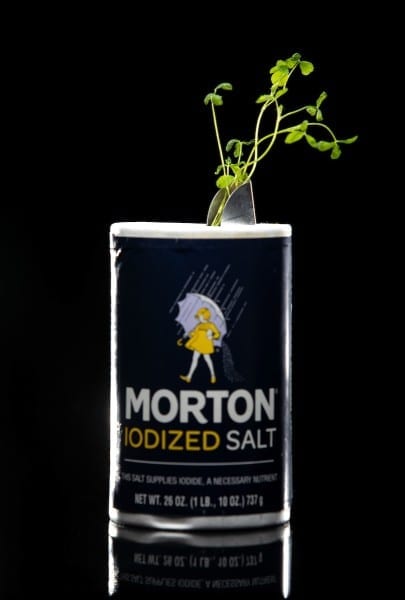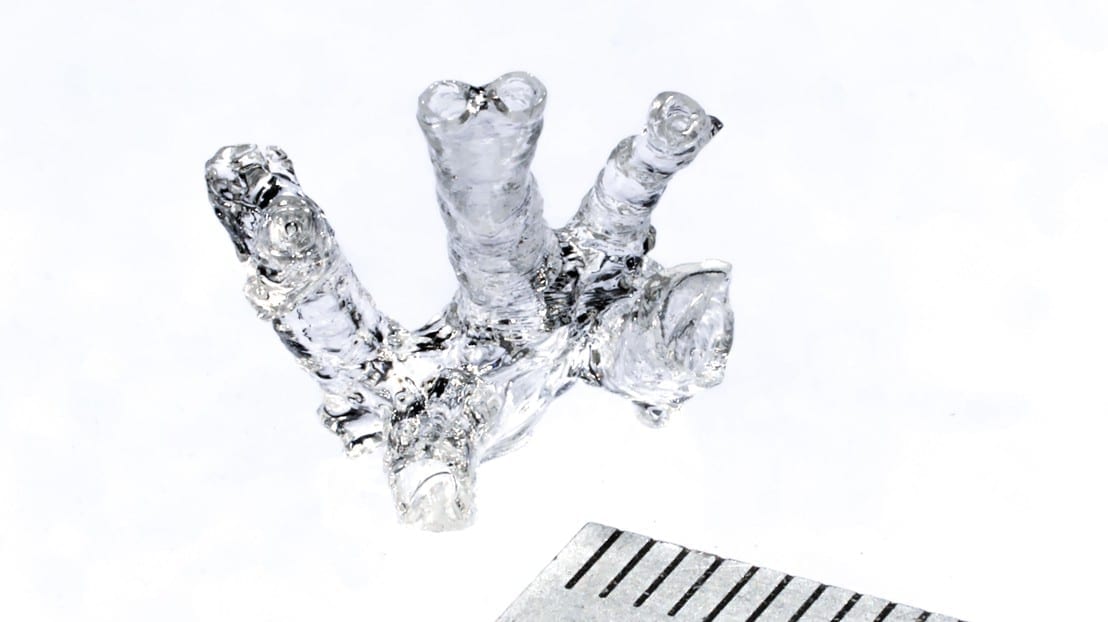A group of BYU researchers may have found a way to reverse falling crop yields caused by increasingly salty farmlands throughout the world.
Led by Brent Nielsen, professor of microbiology and molecular biology, the BYU scientists have used bacteria found in the roots of salt-tolerant plants to successfully inoculate alfalfa plants against overly salty soil.
“We take the roots of these salt-tolerant plants (called halophytes), grind them up and grow the bacteria in a petri dish in the lab,” Nielsen said. “Doing this, we isolated over 40 different bacteria isolates, some of which can tolerate ocean-level salt content.”
The team then applied the bacteria isolates to alfalfa seeds through a solution and tested the alfalfa’s ability to grow in high-saline conditions. They saw significant growth of the alfalfa both in their lab and in greenhouse experiments carried out by collaborators at the Institute for Advanced Learning and Research in Virginia.
The study identifies two specific bacteria isolates — Halomonas and Bacillus — that worked to stimulate plant growth in the presence of 1 percent sodium chloride (salt), a level that significantly inhibits growth of uninoculated plants. This discovery is significant since soils throughout areas of China, Australia and the Middle East have grown increasingly salty, as well as major farmland in the southwest United States.
“As an area of land is repeatedly used for farming, the salinity rises; the irrigation water has salt in it and when it evaporates or is taken up by the plants, the salt is left behind,” said student Caitlyn McNary, one of six BYU undergraduate co-authors on the paper. “With what we’ve found, lands that are now unable to sustain plant life due to high salinity could once again be used for crops.”
In addition to the work on alfalfa, America’s No. 4 crop, the research team has already started to conduct lab and greenhouse experiments on rice, green beans and lettuce. The next step is to carry out field trials on the inoculated crops.
The lab work for the research, recently published online in Frontiers in Microbiology, was carried out primarily by six BYU undergraduate students: McNary and fellow first author Jennifer Kearl, Emily Colton, Steven Smith, Jason West and Michelle Hamson. While McNary and Colton will be back at BYU this fall, others are heading off to dental school, medical school and law school. BYU Plant and Wildlife professor Zachary Aanderud also served as a study co-author.
“We’ve long wondered if increasingly salty land was just a losing battle or if there was something we could do about it,” Nielsen said. “Now we have shown there is something we can do about it.”
Learn more: BYU scientists discover way to make crops grow in salt-damaged soil
The Latest on: Salt-tolerant plants
[google_news title=”” keyword=”salt-tolerant plants” num_posts=”10″ blurb_length=”0″ show_thumb=”left”]
via Google News
The Latest on: Salt-tolerant plants
- Use soil tests to manage salinityon April 26, 2024 at 3:44 pm
Glacier FarmMedia - Producers in Saskatchewan and Manitoba are asking plenty of questions about how to manage salinity in their soil. Jeff Schoenau, a ...
- Wood Frogs Have Evolved Tolerance to Road Salton April 25, 2024 at 2:19 am
We’ve been applying de-icing salts to reduce car accidents in snowy and icy conditions in the United States for 80 years, and we currently apply four times more road salt than we did in the 1970s,” ...
- Researcher finds that wood frogs evolved rapidly in response to road saltson April 24, 2024 at 11:39 am
When we think of evolution, we think of a process that happens over hundreds or thousands of years. In research published in Ecology and Evolution a team led by Rick Relyea, Ph.D., professor of ...
- U.S. East Coast adopts ‘living shorelines’ approach to keep rising seas at bayon April 24, 2024 at 10:22 am
January brought a pair of rough storms to the northeastern U.S. They hit when the tides were high and pushed higher than normal by rising sea levels, setting numerous high-water records and prompting ...
- Alfalfa is not Arizona's water-use enemy. Why we grow so much of it hereon April 24, 2024 at 5:01 am
Opinion: Some argue that growing alfalfa in Arizona is a waste of water. But this crop uses less water than many others and provides many benefits.
- Frog species evolved rapidly in response to road saltson April 22, 2024 at 4:59 pm
suggesting an evolved tolerance. However, the frogs' ability to adapt does not mean that we should expect them to survive if salt levels increase even more. Relyea hopes that insights gained from this ...
- 7 best plants to prevent soil erosion in your yardon December 20, 2023 at 8:44 am
With its warm yellow flowers, the Forsythia is a fast-growing plant and can grow up to 10 feet tall once established. Forsythia is generally low-maintenance, and can tolerate poor soil conditions.
- 8 Plants To Avoid Adding Epsom Salt Toon December 9, 2023 at 11:09 pm
Epsom salt for plants can also cause the soil to be overly moist, and sage doesn't tolerate this well because it's drought-tolerant. This plant originated in South America, in the Andes. They thrive ...
- Flotillin proteins could help plant cells maintain their salt balanceon June 5, 2021 at 10:21 am
which could help plants be more salt-tolerant. The research focused on one of the genes that encode flotillin proteins—components of the cell membrane that are thought to be involved in a range ...
- Salt Impacted Agricultural Landson August 13, 2020 at 7:41 am
UD Cooperative Extension, in collaboration with other partners, is investigating an alternative salt tolerant crop that may be able to sustain the productivity of these impacted lands. Seashore mallow ...
via Bing News










